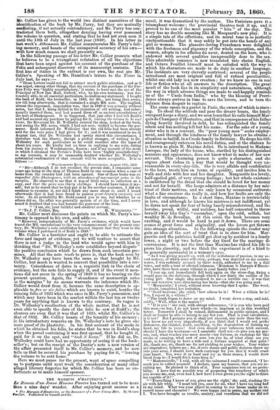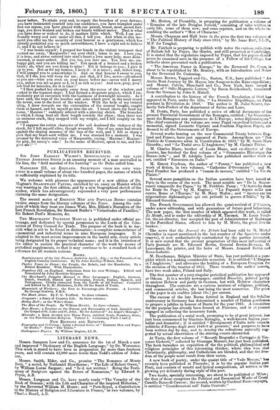THE MARQUIS D'HAITTERITE. * Le Roman d'un Aline ITomme Pauvre has
turned out to be more than a nine days' wonder. After enjoying great success as a * The Marguie d'Hauterioe, or the Romance of a Poor Young Han. By Octave Pettillet. Published by Cassell and Co.
novel, it was dramatized by the author. The Parisians gave it a triumphant welcome ; the provincial theatres took it up, and it proved to be one of the most popular " hits " of the day. The story has no double meaning like M. Mocquard's new play. It is a simple tale of the affections, and its moral tone is so perfectly
unobjectionable that it may safely be put into the hands of any girl or woman. The pleasure-loving Frenchmen were delighted. with the freshness and piquancy of the whole conception, and the women adepts in lea affaires du comr, doated on the hero, who is endowed with several qualities inexpressibly dear to the sex. This admirable romance is now translated into choice English, and Octave Fenillet himself must be satisfied with the way in which his characters are made to do duty in another language. The incidents are very cleverly contrived.; several of the people introduced are most original and full of refined peculiarities,
whilst one old lady is a new creation ; for we know no one in real life or fiction who at all answers to the description. The great merit of the book lies in its simplicity and naturalness, although the way in which adverse things are made to end happily reminds us of the " Uncle from India, who by the blessing of Provi- dence always arrives in time to save the lovers, and to turn the balance from despair to rapture.
The scene opens in a garret in Paris, the owner of which is starv- ing. To cheat the solitude and pass the dreary hours, the lonely occupant keeps a diary, and we soon learnthat he calls himself Mar- quis de Champcey d'Hauterive, and that in consequence of his father dying heavily involved in debt, he has relinquished the family estate and has nothing left but his name. For the sake of a young sister who is in a convent, the "poor young man" seeks employ- ment, and through the kindness of the family lawyer he obtains a situation as bailiff, in a Creole family in Brittany. He drops his title and courageously- enters on his novel duties, and at the chateau he is known as plain M. Maxime Adiot. He is introduced to Madame Laroque, the lady of the house, who startled ,by his distinguished manners and appearance, does not know what to make of her new servant. This charming person is quite a character' and she argues about riches in a way that would be thought very un- reasonable in every-day-life. She is very affable and confidential to the hero, treats him on terms of equality, and invites him to walk and ride with her and her daughter. Marguerite is a lovely, half-spoiled girl, of very strong feelings ; but her whole existence is embittered by the dread that she should. be loved for her money and not for herself. She keeps admirers at a distance by her mis- trust of their motives, and we only learn by occasional outbursts what a fine creature she really is, and how her faults are only the faults of circumstance. In a short time, Maxime is irretrievably in love, and although he knows his mistress is not indifferent, yet he dares not speak for fear of being basely misunderstood, and the heroine, proud, wilful, and reckless, has half consented to throw herself away like Gay's "cucumber," upon the cold, selfish, but wealthy M. de Bevallan. At this crisis the book becomes very exciting, and it would be hard to put it down. There are some scenes of great force and originality, and the lovers get thrown into strange situations. In the following episode the reader may gam an idea of the sort of treat that is in store for him, Mar- guerite and the patrician bailiff get shut up by accident in a lonely tower, a night or two before the day fixed for the manage de convenance. It is not the first time Maxima has risked his life to prove his sincerity, and we think the experiment is of a kind to be generally successful in a woman's eyes.
"As I was giving myself up, with all the selfishness of passion, to my se- cret ecstacy, of which some reflection, perhaps, was depicted on my counte-
nance, I was suddenly aroused by these words, addressed to me in a dull voice and with a tone of affected calmness, Monsieur be Marquis d'Haute- rive, have there been many villains in your fiimily before you ? ' "I rose up, and immediately fell back again on the stone-flag, fixing a stupid gaze on the darkness, through which I saw dimly the outhne of the young girl. One single idea occurred to me—a terrible one : it was that fear and vexation were disordering her brain—that she was going mad.
"'Marguerite,' I cried, without even knowing that I spoke. The word, no doubt, completed her irritation.
" Good heavens,' she cried, 'how odious he is ! What a villain he is ! Yes, I repeat it, a Allan! '
"The truth began to dawn on my mind. I went down a step, and said, Well, what is the matter ?
"'it is you!' she said, with abrupt vehemence, it is you who have paid this man—or boy, I do not know which—to imprison us in this wretched tower. Tomorrow I shall he ruined, dishonoured in public opinion, and I shall no longer be able to belong to any but you. That is your calculation, is it not ? But I promise you it shall not succeed, any more than the rest., You know me yet very imperfectly, if you think that I would not prefer' dishonour, the cloister, death, anything, to the degradation of linking my hand, my life to yours ! And even should your infamous trick succeed, should I have the weakness—as I assuredly shall not—to give you my per- son, and, what touches you more nearly-my fortune, in exchange for this stroke of cunning, what sort of man can you be, of what slime are you made, to be willing to have a wife and a fortune acquired at that price ? Ah, thank me sir, thank me for not yielding to your wishes. Your wishes are imprudent', believe me ; for, if ever shame and public derision threw me into your arms, I should have inch contempt for you that it would crush your heart. Yes, were it as hard and icy as these stones, I would draw blood from it—I would fetch tears from it.
" ' Mademoiselle," I said, with all the calmness I could command, 'I be- seech you to collect yourself. I declare, upon my honour, that you are in- sulting me. Be pleased to think of it. Your suspicions rest on no proba- bility. I have had no possible way of preparing this treachery of which you accuse me, and, even had I, how have I ever given you the right to think me capable of it ? '
"'Everything I know of you gives me the right,' she said, slashing the air with her whip. I must tell you, once for all, what I have too long had in my mind. What was your object in coming to our house under an as- sumed name and character ? We were happy and in peace' my mother and I. You have brought us trouble, anxiety, and vexations that we did not
know before. To attain your end, to repair the breaches of your fortune, you have insinuated yourself into our confidence, you have trampled under foot our, repose, you have played with our purest, truest, most sacred feel- ings, you have bruised and broken our hearts without mercy. That is what you have done or wished to do, it matters little which. Well, I am pro- foundly weary and sore under all this, I tell you. And when at this mo- ment you offer me the security of your honour as a gentleman, which has already permitted you so much unworthiness, I have a right not to believe it, and I do not believe it.'
"I was beside myself; I grasped her hands in the violent transport that carried me away, Marguente ! my poor child ; listen to me. I love you, it is true, and never entered into man's heart a love more holy, more disin- terested, or more ardent. But you too, you love me. You love me, un- happy girl, and you are killing me! You speak of a bruised and a broken heart; ah, what are you doing to mine ! Yet it belongs to you ; I give it up to you. But as for my honour, I keep it : it is intact; and, before long, I will compel you to acknowledge it. And on that honour I swear to you, that, if I die, you will weep for me ; and that, if I live, never—all-adored as you are—were you even on your knees before me—never will I marry you, unless you are as poor as I, or I as rich as you! And now, pray, pray ; ask God for miracles, for it is time ! ' "I then pushed her abruptly away from the recess of the window, and rushed to the topmost steps ; I had formed a desperate project, which I im- mediately put in execution with the hastiness of downright insanity. As I have said, the tops of the beeches and oaks which grew in the moat round the tower, rose to the level of the window. With the help of my twisted whip, I drew towards me the extremities of the nearest boughs, caught them at hazard, and let myself go into the air. I heard above my head my name, ' Maxim ! ' suddenly uttered with a piercing shriek. The branches to which I clung bent all their length towards the abyss ; then there was an ominous crack, they snapped with my weight, and I fell roughly on the ground.
"I suppose the rotten character of the soil deadened the violence of the shock, for I felt myself alive, though wounded. One of my arms had struck against the sloping masonry of the face of the wall, and I felt so sharp a pain that my heart sank within me. I was stunned for a moment. I was aroused by the distracted voice of Marguerite, crying, Maxime ! Maxime ! for pity, for mercy's sake ! In the name of Heaven, speak to me, and for- give me ! ' "



























 Previous page
Previous page